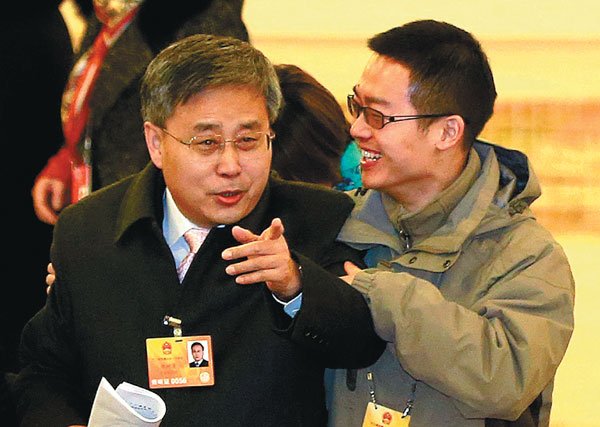More reforms in store for China's stock market
Updated: 2013-03-11 07:06
|
 |
|
Guo Shuqing, chairman of the China Securities Regulatory Commission, is stopped by a reporter before the third plenary meeting of the 12th NPC on Sunday. [Feng Yongbin / China Daily] |
China's top securities regulator pledged to accelerate reforms in the stock market, including widening investment channels and improving the IPO issuing system, to strengthen the development of the mainland's capital pool.
Guo Shuqing, chairman of the China Securities Regulatory Commission, said on Sunday that the quota of renminbi-qualified foreign institutional investors, or RQFII, may be expanded further according to market demand.
"The reform in the securities market will continue and more innovative measures will be released later," Guo said.
The key to future reform is to improve information transparency and innovate regulations based on market demand, he said.
Guo denied that he would take charge of China Investment Corp, the country's sovereign wealth fund manager, a rumor sparked by foreign media during the ongoing two sessions.
On Saturday, the CSRC announced the opening of the mainland stock market to residents from Hong Kong, Macao and Taiwan.
From April 1, the China Securities Depository and Clearing Corp will be able to register and open stock investment accounts for people from those regions.
In addition, individual investors seeking to trade A shares can have the same rights and follow the same rules as residents of the mainland, a statement from the CSRC said.
"As the money will come from their income made in the mainland, there should be no worry about too much capital inflow from overseas into the stock market," Guo said on Sunday.
In the 18 months since Guo became CSRC chairman, the commission has released at least one new policy every week.
He is determined to make the IPO issuing mechanism more market-based and curb speculative activity on newly listed shares.
Song Liping, general manager of the Shenzhen Stock Exchange, said now is the critical time to improve the IPO issuing method.
"The reform should be promoted continually, or the reform cost will be higher in the future," she said.
The new round of share-issuing reforms started in April 2011. The average issuing price of new shares has thus far decreased by 28 percent and the average price-to-earning ratio has declined by 36 percent, which has effectively controlled speculative activities, Song said.
"For the next stage, reforms will focus on improving the information release system, as well as supporting the growth of high quality intermediaries and core institutional investors to become the main market players," she said.
China has suspended new listings for more than four months, during which time the CSRC has required intermediaries including the underwriters, accounting firms and law firms to re-examine the financial situation of enterprises that have applied for IPOs.
The securities regulatory commission's schedule indicates that the re-examination will end on March 31. The market expects that IPOs will then continue.
Fang Fang, Asia vice-chairman and CEO of China with JP Morgan Investment Banking, said that the pause in the issuance of new shares can provide time for the regulator to further improve reforms.
"It should restart as soon as the key changes have been discussed and agreed upon," she said.
However, if the suspension lasts too long, it may hurt the market's confidence and influence companies' fundraising, Fang said.
CSRC's Guo also pledged to continue to encourage public enterprises to allocate dividends to investors and protect their interests.
A new agency may be launched to specially protect public investors, he said, with one possible method involving the establishment of a special fund to limit the risks and compensate investors' losses due to illegal trading.
chenjia1@chinadaily.com.cn


